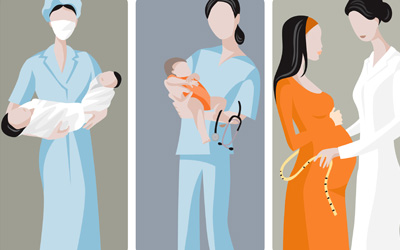Midwifery was practiced by many Native American tribes before the colonial era. With the European expansion, the practice of midwifery gained importance and became a profession. In the 1920s, May Breckinridge, a woman belonging to a notable American family, founded the Frontier Nursing Service (FNS) in Hyden Kentucky. She dedicated herself to promoting midwifery as a prominent occupation and advocated several educational programs for future midwives. Her hard work was recognized all over the country and was a major turning point in the healthcare system.
Overview
Midwives have become an important part of the healthcare system in recent years. These professionals provide primary care to women before, during, and after child birth. Midwives help eliminate the need of unnecessary medical or surgical intervention during labor. More women are turning to midwife services for natal care.
Are you ready to become a midwife?
According to the US Bureau of Labor Statistics (BLS), the demand for nurse midwives is expected to grow by 31% from 2012 to 2022. The employment outlook for midwives is positive, making it a suitable career choice. But before you begin your pursuit of becoming a midwife, you need to find out if you have the skills and passion? Here are some questions you need to ask yourself:
-
Are you interested in helping childbearing women on a daily basis?
-
Do you want to help pregnant women?
-
Are you fascinated by childbirth and consider it as an important life process?
-
Are you interested in becoming a part of the healthcare industry?
-
Are you looking for a career that is rewarding and gives you a sense of achievement?
If the answer to all the above questions is ‘yes’, then read on.

How to become a midwife?
There are several paths to becoming a nurse midwife. You can choose an educational route that matches your career goals and the type of certification you are seeking. To become a certified midwife, you will need to have a masters degree in nurse midwifery. You can enroll in a masters program after completing a bachelor degree in nursing or a relevant field, and acquiring sufficient work experience.
When selecting a midwifery program, make sure the program is accredited by the Accreditation Commission for Midwifery Education.
Nurse Midwife Program
Although there is no midwife degree available, you can go for a masters degree in nursing with specialization in midwifery. Many colleges are offering graduate level midwife programs. This program is designed for students who are preparing for certified nurse midwife careers.
The program is designed to provide students with a rich theoretical foundation of knowledge along with practical training. Students will gain in-depth knowledge of gynecological care, postpartum care, and primary care for women. The first few semesters will be dedicated to theoretical development and fundamental concept building. Further in the program, students will acquire hands on experience and training in clinical settings. The curriculum may cover courses such as the following:
-
Advanced physiology and Pathophysiology
This course will provide students with an overview of organ systems and genetic basis of disease. Students will learn about the interrelationships between clinical Pathophysiology and basic physiology.
-
Healthcare of childbearing women
This course will cover the concepts of prenatal care and nurse midwifery. Topics such as public policy, nurse practitioner management, and obstetric complications are covered.
In this course, students will evaluate risks and high risk maternal fetal dyads. The course will cover a range of topics that help students understand the scientific basis of techniques used to diagnose high risk pregnancies.
-
Scientific inquiry for evidence based practice
Here students will learn about research problems and analytical techniques used for studies. Topics such as the following are covered: quantitative and qualitative research, information science, health policy implication, and clinical reasoning.
-
Complementary and alternative therapies in women’s health
This course will cover the complementary and alternative medicine (CAM) therapies used. Students will gain an understanding of some of the basic approaches used in this field.
Certification
There are a number of boards offering nurse midwife certifications. The American Midwifery Certification Board is a leading body that offers the Certified Nurse Midwife and Certified Midwife certifications. The requirements for each certification will vary. Applicants are required to pass the certification exam conducted by the board.
What skills will you develop with these certifications?
-
Communication skills
-
Interpersonal skills
-
Nursing skills
-
Assessment skills
-
Analytical skills
-
Problem solving skills
-
Decision making skills

Can you study online?
You can pursue a nurse midwife program online. The coursework is taught with the help of online lectures, videos, tutorials, and other online learning resources. Please remember that many colleges are offering hybrid programs. With a hybrid program, students cover the theoretical portion of the course online, and the practical part on-campus. There are many benefits of studying online. You can save up on costs, study in your free time, and not worry about travelling to college.
How to enroll in nurse midwife program?
The admission requirements will depend on the institute you want to enroll in. Typically, a bachelor degree is required to qualify for admission in a masters level midwife program. However, some schools are also offering admission to students who do not have a background in nursing education. It is best that you check with prospective schools and learn more about the admission criteria. Here are some general requirements of admission:
-
Admission application
-
Nursing work experience
-
Minimum CGPA of 3.0
-
Letter of recommendation
Career as a nurse midwife
As a nurse midwife, you can work in different healthcare settings such as hospitals and clinics. Your main job duties will include:
-
Provide guidance to childbearing women
-
Assessing health
-
Developing health care plans for patients
-
Assisting women through the birthing process
-
Helping women deal with physical and emotional challenges that come with pregnancy
According to the US Bureau of Labor Statistics (BLS), nurse midwives made a median annual income of $96,970 in 2014. Most midwives were employed in physician offices, surgical hospitals, offices of other healthcare practitioners, and outpatient centers.